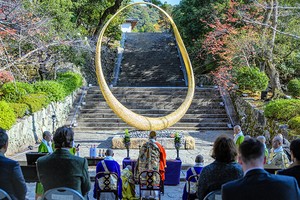Vox Populi, Vox Dei is a daily column that runs on Page 1 of The Asahi Shimbun.
November 25, 2022 at 15:26 JST
 Supporters hold candidate banners during an election campaign in Taipei on Nov. 20. (AP Photo)
Supporters hold candidate banners during an election campaign in Taipei on Nov. 20. (AP Photo)
Chinese phrases that mean “frozen garlic,” “town clean-up” and “dried mangoes” are said to be heard everywhere in Taiwan right now.
They sound bizarre to foreigners, but for locals, they are familiar election terms that resemble different Chinese expressions in terms of pronunciation or other elements. They respectively actually mean “election win,” "campaign tour” and a “sense of despair in losing a homeland.”
Unified local elections are being held in Taiwan on Nov. 26. Regardless of the outcome, I was relieved to hear that this election cycle has been quite lively. Apparently, even the COVID-19 pandemic hasn’t affected the Taiwanese people’s predilection for elections.
An election in Taiwan is like a Japanese “matsuri” festival and outdoor concert rolled into one. Food stalls line polling places, attracting hordes of families, and many celebrities keep appearing under bright lights while up-tempo music fills the air.
This is a copy of U.S. election events, but the Taiwanese version has a far greater mass appeal.
“That’s because our democracy was hard won with the blood and sweat of our forebears,” said an elderly friend of mine.
Until the late 1980s, Taiwan was under a dictatorial rule that did not tolerate dissent. That, probably, is why the people today are really determined to enjoy free elections.
I read an autobiography by Peng Ming-min, a candidate in Taiwan’s first direct presidential election in 1996, who died this past spring at the age of 98.
Peng was arrested in 1964 for calling for Taiwan’s independence and democracy. Back then, speech was suppressed with unimaginable ruthlessness.
Recalling when he finally defected using a fake passport, he wrote, “I felt as if my body would break under the sheer intensity of my sense of freedom.”
Just having an election does not make democracy function. I think the strength of Taiwan’s democratic society today is entirely owed to the people’s conviction that they have truly participated in the process of choosing their own representatives.
Tomorrow night, I will keep my ears open to shouts of “frozen garlic” from the neighboring island nation.
--The Asahi Shimbun, Nov. 25
* * *
Vox Populi, Vox Dei is a popular daily column that takes up a wide range of topics, including culture, arts and social trends and developments. Written by veteran Asahi Shimbun writers, the column provides useful perspectives on and insights into contemporary Japan and its culture.




















A peek through the music industry’s curtain at the producers who harnessed social media to help their idols go global.
A series based on diplomatic documents declassified by Japan’s Foreign Ministry
Here is a collection of first-hand accounts by “hibakusha” atomic bomb survivors.
Cooking experts, chefs and others involved in the field of food introduce their special recipes intertwined with their paths in life.
A series about Japanese-Americans and their memories of World War II